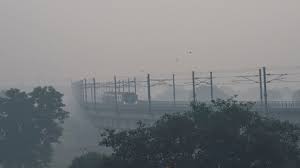
As Delhi-NCR continues to battle hazardous air quality, a survey by Local Circles has revealed that every family in the region has at least one member suffering from pollution-related health problems. The toxic air has prompted schools and offices to shift to online classes and work-from-home arrangements to mitigate the health risks posed by the worsening Air Quality Index (AQI).
Air Quality Hits Dangerous Levels
The Central Pollution Control Board (CPCB) recorded Delhi’s 24-hour average AQI at a severe 424 on Wednesday. The PM2.5 levels in the air were reported to be 60 times higher than the World Health Organization’s (WHO) recommended daily limit. The WHO advises an annual average PM2.5 level of no more than 5 μg/m³, highlighting the dire air quality situation in the capital.
Health Impact on Families
The survey showed that:
- 75% of families have members experiencing sore throat or cough.
- 58% have reported headaches.
- 50% have members suffering from asthma or breathing difficulties due to pollution.
Within a month, the number of families reporting at least one member with pollution-related health issues has doubled.
Coping Mechanisms
To combat the health impact, families are adopting various strategies:
- 27% use air purifiers, stay indoors, and focus on immunity-boosting foods and drinks.
- 16% are traveling or planning to relocate to areas with better air quality.
- However, 27% of families indicated they would not take any specific measures and continue living with the pollution.
For those who can afford it, investing in smart air purifiers and technology has become a necessity.
GRAP Stage-4 Restrictions
In response to the severe pollution levels, authorities have implemented Stage 4 of the Graded Response Action Plan (GRAP). Measures include:
- A ban on diesel-powered vehicles and non-essential truck entries into Delhi.
- Online classes and work-from-home protocols for schools and offices.
Supreme Court Criticizes Delhi Government
The Supreme Court recently reprimanded the Delhi government for its delay in enforcing GRAP Stage-4 restrictions despite the alarming rise in AQI levels. A bench comprising Justices Abhay S Oka and Augustine George Masih expressed concern, stating, “The moment the AQI reaches between 300 and 400, Stage 4 has to be invoked. How can you take risks in these matters by delaying the applicability of Stage 4 of GRAP?”
The court firmly stated that it would not permit any relaxation of preventive measures, even if AQI levels slightly improve.
Outlook
As air quality in Delhi-NCR remains hazardous, families and authorities alike are grappling with the challenges of managing health risks and implementing effective measures. For now, the toxic air continues to pose a serious threat to the region’s residents.
Sources By Agencies




